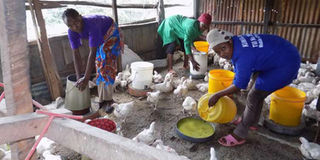Diary of a Poultry Farmer: Beware, rats are fond of chicken houses

Chicken farmers attend to the flock in Kiambu. Rats tend to inhabit chicken houses. FILE PHOTO | NATION MEDIA GROUP
What you need to know:
- To keep thieves and animal predators at bay, I keep two German Shepherd dogs on the farm in Njiru, Nairobi.
- Fleas are tiny parasites that feed on human and other warm blooded animals and can easily spread from animals to poultry.
- The obvious consequence to all this is a drop in egg production.
- Other rodents you may encounter in rural areas are squirrels, porcupines and mongooses. For rodents, the solution is normally to keep a dog or cats.
Two weeks ago, I arrived on the farm and was confronted with carcasses of 10 dead birds that had been eaten half down to the bone.
The first thing that came to my mind was a stray dog or a cat.
You see, to keep thieves and animal predators at bay, I keep two German Shepherd dogs on the farm in Njiru, Nairobi.
One is normally let loose at night but confined within the chain link. The other is normally locked up in the kernel.
If you recall, the two dogs, Jack and Jane, haven’t quite learnt to co-exist with the birds and sometimes they exhibit predatory tendencies.
“Did you ensure the doors to the coop and main gate were locked all night?” I asked Cleophas, the farm manager. He answered in the affirmative.
“So what could be killing the birds?” I wondered loudly.
If there were stray cats in the neighbourhood, I would be more worried because the animals can penetrate small openings in the coop.
Cleophas later informed me that in the last few days, he had noticed the birds shuffling at night but could not figure out what was the cause.
I asked him to be more vigilant. Two days later, Cleophas called to share some clues. He had observed commotion and stampede in the coop.
SPREAD FROM ANIMALS TO POULTRY
When he went to check out, he saw three big rats dashing across and disappeared below the coop.
I have dealt before with pests (fleas) but not rodents. If you recall (January 9), the fleas had spread from the dog to the chickens.
Fleas are tiny parasites that feed on human and other warm blooded animals and can easily spread from animals to poultry.
I applied Sevin dudu dust on the floor and walls of the coop and the problem cleared. For the dog, Stephen Omari, a veterinary surgeon, advised me to apply a lotion called Frontline and it also solved the problem.
From my research, I found out that rats like chicken coops because they can find ready food from the mashes offered to the birds, water and housing.
Now, dealing with rats was new to me, and, from my recollections, many readers had written to complain that the coloured pellets sold in most agrovets didn’t seem to work well against the rodents.
I called Dr Mugachia of Gardenvet, Nairobi for advice. “You need to eradicate these rats immediately,” he warned, “In addition to causing stampede that could lead to death as a result of trampling, rats are very potent introducers of diseases to poultry, including coccidiosis and a host of bacterial and parasitic infections.”
The obvious consequence to all this is a drop in egg production.
CONTROLLING THE RODENTS
He advised me to use a slow-killing rat poison such as Lanirat (Bromodiolone) or other anticoagulant based rodenticides.
For sure, I found this rather confusing because according to my reasoning, the rapid-killers like Zinc Sulphide do the job faster, within minutes.
His answer, which surprised me, was, “The problem with the rapid-killers is that rats associate them with death and being clever animals, they teach others, including the young ones, to avoid them.”
He explained that the advantage with the slow-killers was that rats die after three to seven days away from the farm and it is hard for others to associate the death with the poison.
In addition, he said it was important to “establish a clear zone” free of vegetation around the chicken coop to discourage rodent and insect traffic into the buildings or pens.
Using a Kukunet in addition to a wire mesh can help also to keep the rodents at bay.
Other rodents you may encounter in rural areas are squirrels, porcupines and mongooses. For rodents, the solution is normally to keep a dog or cats. For now, the problem is solved.
Obwogo is a medical doctor and a senior quality improvement adviser in health policy and systems strengthening at an international NGO.





